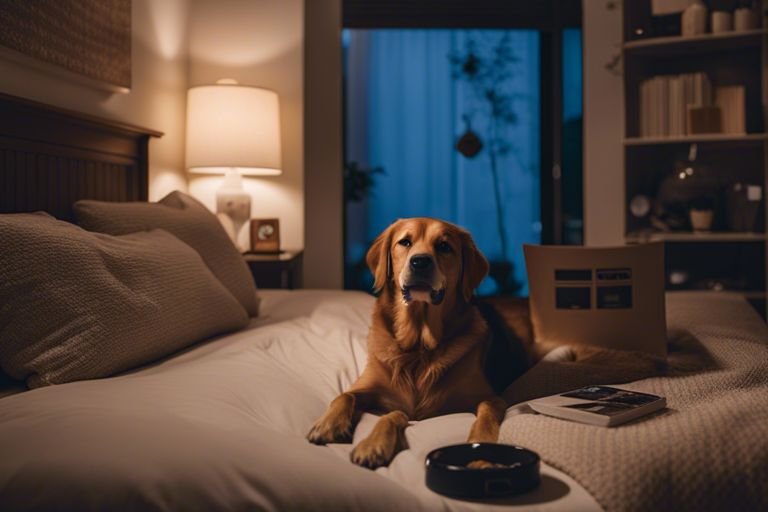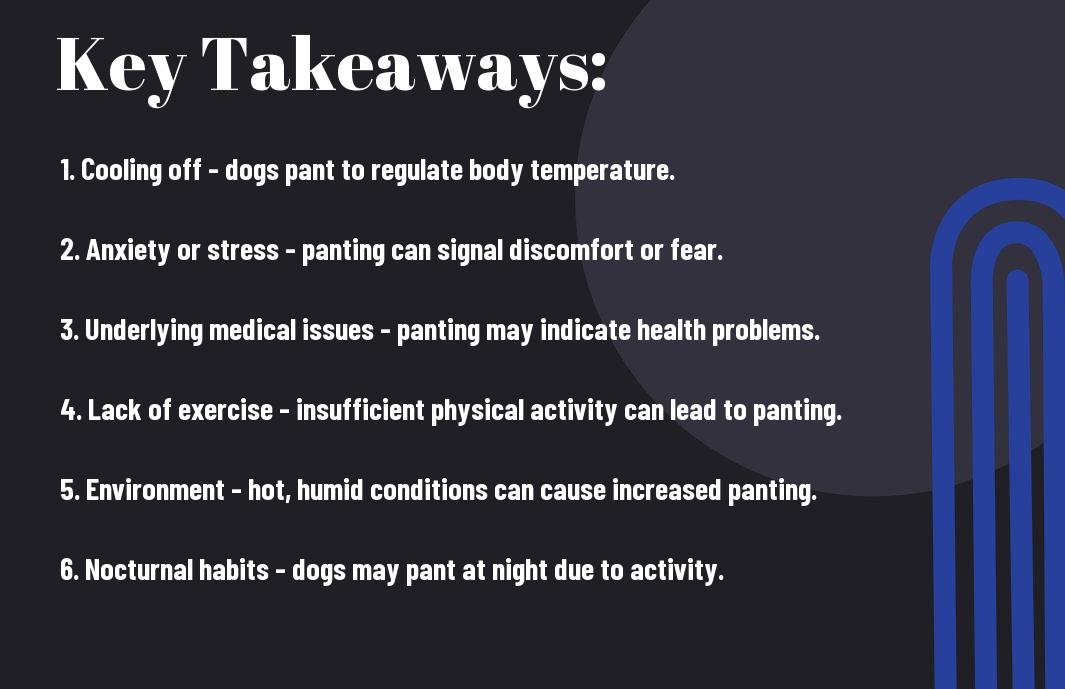Why Do Dogs Pant at Night – Unraveling Canine Nocturnal Behavior
- Home
- Why Do Dogs Pant at Night – Unraveling Canine Nocturnal Behavior

Why Do Dogs Pant at Night – Unraveling Canine Nocturnal Behavior
Let’s delve into the mystery of why our beloved canine companions exhibit panting behavior at night. As a dog owner, it’s essential to understand the reasons behind this common yet puzzling behavior, as it could indicate underlying health issues. In this blog post, I will shed light on the potential causes of your dog’s nocturnal panting and what you can do to ensure your furry friend’s well-being during the nighttime hours.
Key Takeaways:
- Anxiety and Stress: Panting at night can be a sign of anxiety or stress in dogs, caused by various factors such as loud noises, separation anxiety, or changes in routine.
- Temperature Regulation: Dogs pant to cool down when they are too hot, so panting at night may indicate that the room is too warm for them to be comfortable.
- Medical Issues: Nocturnal panting could be a symptom of an underlying medical condition such as heart disease, Cushing’s disease, or respiratory issues, and should be evaluated by a veterinarian.
- Nocturnal Activity: Dogs are naturally crepuscular animals, meaning they are most active during dawn and dusk. Nocturnal panting may simply be a part of their normal behavior pattern.
- Breeds and Age: Certain breeds and older dogs are more prone to nocturnal panting due to their physical characteristics and age-related health issues.
Understanding Canine Nocturnal Behavior
Before diving into the reasons why dogs pant at night, it’s important to understand their nocturnal behavior. While dogs are known to be diurnal mammals, meaning they are most active during the day, they also possess nocturnal instincts similar to their ancestors, the wolves. Understanding these instincts can help us decipher their behavior at night.
The Natural Instinct of Dogs
As descendants of wolves, dogs have inherited nocturnal instincts that are deeply ingrained in their DNA. In the wild, wolves are known to be most active during the night, hunting for prey and protecting their territory. While domestication has altered some of these instincts, dogs still retain a strong sense of vigilance during the night. They have a natural tendency to be more alert and attentive when the world around them is quiet, which often leads to increased panting as a way to regulate their body temperature during periods of heightened awareness.
Factors Influencing Nocturnal Panting
Several factors can influence why dogs pant at night. Stress and anxiety are common culprits, as dogs can become uneasy during the night due to unfamiliar noises or changes in their environment. Additionally, physical discomfort such as pain from an underlying medical condition, or overheating in warmer weather can also lead to nocturnal panting. Furthermore, certain breeds, especially those with short noses like pugs or bulldogs, are more prone to nocturnal panting due to their anatomy. Additionally, age can play a role, as senior dogs may experience nocturnal panting due to age-related health issues. Lastly, medical conditions such as heart problems or respiratory issues can also contribute to nocturnal panting. Though it is important to address these factors, it is crucial to consult with a veterinarian to rule out any underlying health concerns.
I hope this chapter has provided a better understanding of your canine companion’s nocturnal behavior. In the next chapter, we will delve into specific strategies to help alleviate nocturnal panting in dogs.
Health Issues Related to Nocturnal Panting
Some health issues can cause dogs to pant excessively at night, which can be a cause for concern for pet owners. In some cases, this nocturnal panting may be a sign of an underlying health problem that requires attention from a veterinarian. It’s important to be aware of the potential health issues related to nocturnal panting and to monitor your dog’s behavior closely.
Anxiety and Stress
One of the common reasons for nocturnal panting in dogs is anxiety and stress. Just like humans, dogs can experience anxiety and stress, especially at night when the house is quiet and they are left alone. Separation anxiety, loud noises, and changes in routine or environment can all contribute to nocturnal panting. If your dog is displaying signs of anxiety or stress, it’s important to address the underlying issues and provide a comforting environment for your pet. Consulting with a professional dog behaviorist or veterinarian can help you understand and address your dog’s anxiety.
Physical Health Problems
Another reason for nocturnal panting in dogs could be physical health problems. This could include respiratory issues, heart problems, pain, or discomfort. For example, an underlying respiratory problem could cause your dog to pant at night as they struggle to breathe properly. Similarly, heart conditions or pain from arthritis can also lead to panting. It’s crucial to monitor your dog’s overall health and consult with a veterinarian if you suspect any physical health issues. Prompt medical attention can help address the root cause of the nocturnal panting and improve your dog’s quality of life.
Coping Strategies for Nocturnal Panting
Not all dogs will respond to the same coping strategies, so it may take some trial and error to figure out what works best for your furry friend. However, there are some general strategies you can try to help alleviate panting at night and promote a more restful sleep for both you and your dog.
Creating a Comfortable Sleeping Environment
One of the first things you can do to help your dog cope with nocturnal panting is to create a comfortable sleeping environment. Make sure your dog has a cozy bed in a quiet, dark, and cool area of your home. Consider using a white noise machine to drown out any outside sounds that may be causing your dog to become anxious and pant at night.
Behavioral Training and Relaxation Techniques
Another strategy for coping with nocturnal panting is to incorporate behavioral training and relaxation techniques into your dog’s routine. This can include activities such as regular exercise during the day to help tire your dog out, mental stimulation through puzzle toys, and relaxation techniques such as gentle massage or music therapy. Additionally, consider implementing a consistent nighttime routine to help your dog feel more secure and relaxed at bedtime.

Why Do Dogs Pant at Night – Unraveling Canine Nocturnal Behavior
On the whole, understanding why dogs pant at night requires a thoughtful consideration of their individual health, environment, and behavior. While it is often a result of natural thermoregulation or anxiety, it can also be a symptom of an underlying health issue. By paying close attention to your dog’s behavior, monitoring their environment, and seeking advice from a veterinarian, you can ensure that your furry friend is comfortable and healthy during the night. It is important to remember that each dog is unique, and their panting at night may be influenced by a variety of factors. Keeping this in mind, it is important to observe your dog’s behavior closely and seek professional help if you have concerns about their nighttime panting.
FAQ
Q: Why do dogs pant at night?
A: Dogs may pant at night due to various reasons such as anxiety, discomfort, increased body temperature, or underlying medical conditions. It’s important to monitor their behavior and consult a veterinarian if the panting persists.
Q: Is it normal for dogs to pant heavily during sleep?
A: Occasional light panting during sleep is normal for dogs, especially after physical activity. However, heavy or excessive panting during sleep may indicate an underlying health issue and should be evaluated by a vet.
Q: How can I help my dog stop panting at night?
A: To help your dog stop panting at night, ensure they have a comfortable and cool sleeping environment, provide plenty of water, and engage in regular exercise during the day to reduce anxiety and excess energy.
Q: Are certain dog breeds more prone to nocturnal panting?
A: Some dog breeds, such as brachycephalic breeds (e.g. Bulldogs, Pugs) and breeds with thick coats, may be more prone to nocturnal panting due to respiratory or heat regulation issues. It’s important to be aware of your specific breed’s tendencies and monitor their nighttime behavior accordingly.
Q: When should I be concerned about my dog’s nighttime panting?
A: If your dog’s nighttime panting is accompanied by other symptoms such as restlessness, lethargy, excessive thirst, or coughing, it’s important to seek veterinary advice to rule out any underlying health issues. Additionally, if the panting is persistent and disruptive to their sleep, it’s best to consult with a veterinarian for further evaluation and guidance.
- Share
Mark Twain
Mark Twain stands at the helm of Create More Flow, infusing every sentence with the wisdom of his 15-year expeience through the seas of SEO and content creation. A former BBC Writer, Mark has a knack for weaving simplicity and clarity into a tapestry of engaging narratives. In the realm of content, he is both a guardian and a guide, helping words find their flow and stories find their homes in the hearts of readers. Mark's approach is grounded in the belief that the best content feels like a chat with an old friend: warm, inviting, and always memorable. Let Mark's expertise light up your website with content that's as friendly to Google as it is to your audience. Each word is chosen with care, each sentence crafted with skill - all to give your message the human touch that both readers and search engines love.
